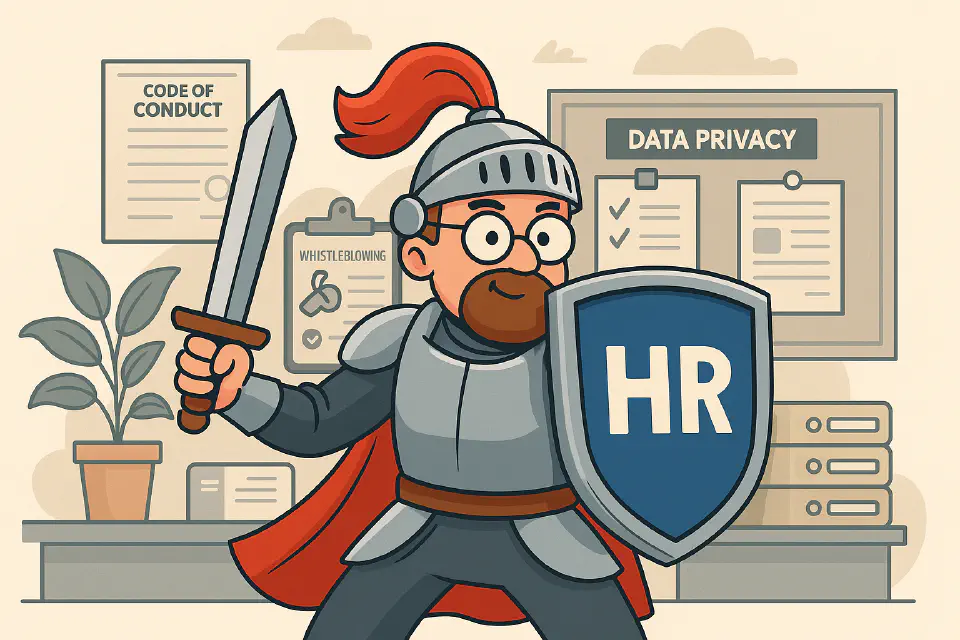
HR as a Compliance Guardian
From contracts to conduct, HR stands at the intersection of people and policy. This page explores how HR professionals act as guardians of legal compliance, ethical standards, and internal policies — ensuring protection without killing trust or culture.
Why Compliance Is a Strategic HR Function
Compliance isn’t just about rules — it’s about protecting the organization’s license to operate, managing reputational risk, and ensuring people are treated fairly and lawfully.
Without strong compliance, companies face:
- Legal exposure (fines, lawsuits, audits)
- Reputational damage
- Toxic work environments
But done well, compliance also builds:
- Trust with employees
- Accountability in leadership
- Stability in systems and processes
What Compliance Actually Covers in HR
Compliance is often imagined as a checklist or legal code — but it spans multiple domains:
| Domain | Examples |
|---|---|
| Employment Law | Contracts, working hours, termination, discrimination |
| Data Privacy & Security | GDPR, employee data handling, background checks |
| Compensation & Benefits | Equal pay, tax reporting, statutory leave, pensions |
| Workplace Conduct | Harassment, bullying, ethics violations |
| Policy Adherence | Code of conduct, dress code, remote work policy |
| Whistleblowing & Escalation | Reporting channels, anti-retaliation |
The Legal vs. Ethical Balance
Good HR compliance is not just legalistic — it’s ethical. The goal is not simply to “not get sued,” but to:
- Protect employee rights
- Act fairly and transparently
- Create consistent standards across the organization
Responsibilities of HR as a Compliance Guardian
🔹 Policy Design & Implementation
- Create or update clear, accessible HR policies
- Ensure alignment with local/national laws across locations
- Collaborate with legal, risk, and works councils
🔹 Education & Training
- Run compliance onboarding for new hires
- Provide manager training on sensitive topics (e.g. discrimination)
- Refresh employees regularly on code of conduct and reporting channels
🔹 Monitoring & Auditing
- Review adherence to time tracking, pay, data security
- Monitor HRIS data for policy breaches
- Prepare for audits, inspections, or certifications
🔹 Investigations & Escalations
- Conduct fair, confidential internal investigations
- Document processes and findings
- Act swiftly on complaints and violations
🔹 Reporting & Governance
- Maintain dashboards of compliance KPIs
- Report to board/legal/risk committees as needed
- Collaborate on incident response and mitigation plans
What Good Compliance Looks Like in Practice
Case 1: GDPR Implementation for Global Workforce
HR partnered with IT and legal to:
- Review all employee data practices
- Localize privacy notices
- Run awareness campaigns
Result: Successful GDPR audit; no breaches. Employees gained clarity on how their data is used.
Case 2: Overhauling Code of Conduct
After multiple unclear misconduct cases, HR:
- Rewrote policies in accessible language
- Included scenarios and decision trees
- Trained managers to interpret and apply fairly
Outcome: Policy awareness increased. Complaints were addressed faster and more consistently.
Case 3: Handling Harassment Allegations
An employee filed a complaint against a senior leader. HR:
- Activated third-party investigator
- Protected whistleblower identity
- Took action despite political resistance
Outcome: Trust increased. Surveys showed belief in fairness rose by 22%.
Challenges HR Faces in Compliance Work
- Underfunded systems (no tech to track incidents or data)
- Cultural resistance to “HR policing”
- Grey areas between policy and leadership preferences
- Fear of retaliation among employees reporting violations
- Pressure to “cover up” issues from senior stakeholders
What HR Needs to Guard Compliance Effectively
| Capability | Description |
|---|---|
| Legal Literacy | Understand local labor laws, data protection, benefits |
| Policy Design | Translate legal risk into usable internal guidelines |
| Documentation | Ensure defensible records, transparency, and consistency |
| Investigation Skills | Handle sensitive topics with fairness, speed, neutrality |
| Influence | Push back against cultural/political resistance |
Best Practice: Build Trust-Driven Compliance
Final Thought
Compliance is not the enemy of culture — it protects it. When HR owns compliance well, the company is safer, fairer, and more trusted.
The best HR teams don’t just write the rules. They create environments where the right thing is also the easy thing — and the expected thing.